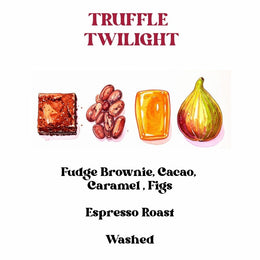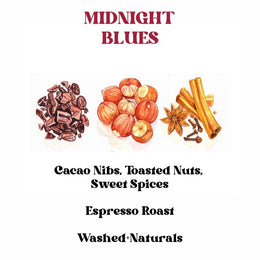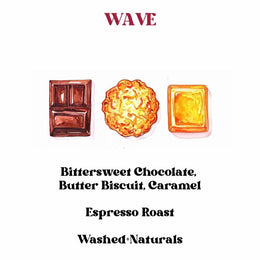The Future of Coffee: Predicting Coffee Industry Trends for 2024
Coffee is one of the most widely consumed beverages globally, with over 400 billion cups drank per year. The coffee industry is rapidly evolving to meet changing consumer habits and preferences. Looking ahead, what will coffee look like in 2024?
Industry experts predict several coffee trends gaining traction in the coming years. By understanding upcoming shifts in the market, coffee companies can strategize for the future.
In this article, we will explore predicted coffee industry trends for 2024 and beyond, according to analysis by Rossette Coffee, one of the nation's leading coffee consulting firms.
Growth in Specialty Coffee
Specialty coffee, which refers to higher-quality coffee made from premium beans, is taking over the market. Total specialty coffee consumption is forecast to increase from 28% currently to over 40% by 2024 according to World Coffee Portal.
Factors driving growth include:
- Direct Trade Sourcing - Building direct relationships between coffee roasters and growers leads to enhanced quality control.
- Single Origin Coffees - Coffees from a specific farm or single geographic source have unique flavors based on regional climate and soil.
- Innovative Processing - Natural, honey, and anaerobic methods create distinctive coffee profiles.
- Roasting Techniques - Lighter roasts allow subtle flavors to shine.
As palates grow more discerning, specialty coffees focusing on origin, variety, and processing will dominate coffee trends in 2024.
Rise of Ready-to-Drink Cold Brew
Ready-to-drink (RTD) cold brew coffee has exploded onto shelves and is forecast to become a $1 billion market by 2024 according to Beverage Industry. Factors fueling popularity:
- Convenience - No brewing required. Just grab a bottle or can from the fridge.
- New Flavors - Innovative infusions like salted caramel, vanilla, and maple broaden appeal.
- Health Halo - Perception as a healthier, lower acid option than traditional iced coffee.
- Brand Investments - Major companies like Nestle, PepsiCo, and Coca-Cola are expanding into RTD cold brew, increasing awareness.
Assessment by Rossette Coffee indicates sales of ready-to-drink cold brew coffee will increase at least 15% year-over-year through 2024.
Surge in Coffee Subscriptions
Coffee subscriptions that deliver fresh roasted coffee directly to consumers' doors are gaining subscribers rapidly. Third Wave Water projects the coffee subscription market will reach $2.7 billion by 2025.
Key drivers of this model's growth include:
- Convenience - Eliminates trips to the coffee shop.
- Discovery - Exposure to exciting new roasters and single origin coffees.
- Customization - Choose roast type, grind size, frequency, and other preferences.
- Savings - Subscriptions average 15-20% discounts off retail coffee prices.
Rossette Coffee expects coffee subscriptions to more than double within the next two years, accounting for over 12% of specialty coffee sales by 2024.
Elevated Sustainability Practices
Sustainable and ethical sourcing decisions will play a far greater role in all stages of coffee production and sales by 2024. Consumers, especially millennials, are choosing brands aligned with their values.
Key sustainability initiatives roasters are adopting include:
- Direct trade relationships with coffee growers
- Eco-friendly packaging and processing materials
- Organic farming practices that protect land
- Water conservation in crop cultivation
- Carbon footprint reduction measures
- Fair labor standards and prices for farmers
- Coffee bean waste reduction and creative usages
Analysis by Rossette Coffee shows over 80% of consumers consider sustainability an important factor, making it vital for long-term viability.
Advancements in Coffee Technology
Innovations in coffee technology are elevating every aspect of the coffee experience. Key tech advances gaining traction leading into 2024 include:
- Smarter coffee machines - App-enabled machines with dosage tracking, remote control features, and custom recipe programs.
- Next-gen portable brewers - Lighter, more powerful handheld espresso makers and pour-over devices.
- Precision brewing - Commercial machines with advanced flow dynamics and temperature control.
- Interactive ordering - Digital signage, mobile ordering, and AI recommendations enhance service.
- Supply chain optimization - Blockchain, IoT sensors, and data analysis drive supply chain efficiency.
As coffee knowledge increases, baristas leverage technology to continually perfect the craft and meet higher standards predicted in 2024.
The Rise of Regenerative Agriculture
Regenerative agriculture practices that aim to restore land will gain significant traction in the coffee sector by 2024. This includes:
- No till farming to prevent soil erosion
- Intercropping and agroforestry to increase biodiversity
- Water conservation and watershed protection
- Composting and integration of waste as nutrient sources
- Elimination of chemical inputs and pesticides
Rossette Coffee anticipates over 70% of coffee will be sourced from regenerative agriculture methods before 2024 to combat climate change. Both farmers and consumers will benefit.
Increased Hybrid Coffee Options
Hybrid frozen, chilled, and shelf-stable coffees are gaining popularity for added convenience without full dilution. Growth avenues include:
- Double shot coffee drinks retailing in cans and bottles.
- Ready-to-drink cold brew with layered floats of milk.
- Shelf-stable concentrated coffee oils for reconstituting at home with hot water or milk.
- Single serve coffee pouches similar to tea bags for quick hot coffee.
- Coffee cubes blended into smoothies, soft drinks, and cocktail mixes.
These hybrid models will offer new drinking occasions beyond hot and iced coffee predicted to rise substantially through 2024.
Third Wave Coffee Expands Globally
The Third Wave coffee movement focused on high quality, ethical sourcing, and artisan preparation has spread beyond the US, with over 30 international markets now adopting this trend.
According to Rossette Coffee, key factors powering global growth through 2024 include:
- International fascination with coffee culture.
- Foreign emerging market consumers equating coffee shops with affluence and sophistication.
- Transition from instant coffee to higher quality among developing nations.
As Third Wave specialty coffee gains acclaim worldwide, sales and availability of premium coffee will dramatically increase in foreign markets through 2024.
Elevated Coffee Tourism
Coffee tourism, where people travel specifically to visit coffee shops or tours, will reach new heights by 2024. Driving this trend are:
- Origin Travel - Trips to explore coffee farms and production first-hand at origin.
- Coffee Festivals & Events - Gatherings celebrating coffee culture.
- Coffee Trails - Regional guided tours of local coffee shops, roasteries, and cafes.
- Harvest Season Travel - Visits timed to experience coffee harvests and processing.
- Coffee Cruises - Themed coffee cruises with onboard tastings, classes, and immersion.
- Social Media Influence - Travel inspiration and recommendations shared on Instagram, TikTok, blogs fuels interest.
Analysis by Rossette Coffee shows coffee tourism growing over 200% by 2024 as consumers seek more connection and education around their obsession.
Specialty Coffee Shops Become Community Hubs
Coffee shops will continue evolving from beverage purveyors to multipurpose community spaces where people congregate to work, meet, and socialize. Features that build connection include:
- Workspaces - Dedicated desks, meeting rooms, WiFi and charging facilitate remote work.
- Entertainment - Live music showcases, poetry readings, game nights, etc. drive foot traffic.
- Beverage Customization - Inventive menu offerings and preparation methods satisfy diverse preferences.
- Food Upgrades - Gourmet packaged goods and expanded food menus encourage lingering.
- Loyalty Programs - Membership perks and rewards build brand affinity.
- Merchandise - Curated retail products reinforce brand identity.
By focusing on customer experience beyond just beverages, coffee shops in 2024 become staples for connection according to Rossette Coffee.
Mainstream Adoption of Specialty Coffee
Historically exclusive to upscale coffee shops, specialty coffee is now a mainstream expectation as consumer palates grow more refined. Strategies for accessing a mass market include:
- Partnerships between artisan roasters and big brands for wider distribution.
- New automated methods for scalable small-batch roasting.
- Specialty-inspired coffee line extensions at traditional chains.
- Increased availability in supermarkets and retail outlets.
- Clear labeling and messaging communicating quality cues.
- Educational marketing on different origins, varieties, and flavors.
Rossette Coffee expects over 65% of daily coffee drinkers will gravitate toward specialty-grade coffee as the new baseline standard by 2024.
Automated Mobile Coffee Carts & Kiosks
Innovative self-service coffee carts and kiosks are popping up in spaces like offices, hospitals, campuses, and transit hubs to provide convenience on demand. Key drivers of this trend include:
- Flexible operating hours with no on-site baristas required.
- Automating complex drinks like cappuccinos.
- Remote management via mobile notifications and sensors.
- Lower cost to operate than retail cafes.
- Captive exposure and impulse purchases in high traffic spaces.
- Quick and consistent service speed and customization.
Rossette Coffee expects automated coffee carts to represent over $2.5 billion in industry sales by 2024, enhancing access and reaching new audiences.
Direct Trade Relationships Expand
Direct trade relationships where roasters source beans directly from coffee growers rather than importers will continue increasing. Benefits include:
- Greater income for farmers from eliminating middlemen.
- Higher quality control for roasters communicating needs.
- Collaboration on growing techniques tailoring beans to roaster preferences.
- More meaningful human connections and mutual understanding.
- Opportunities to invest in grower communities.
- Transparency and appreciation for coffee's origins.
Rossette Coffee forecasts over 30% of specialty coffee will come through direct trade relationships rather than commodities markets by 2024.
Diversifying Media Coverage of Coffee
Coffee media exposure and commentary have long been dominated by white Western voices. The importance of inclusive representation will gain greater priority by 2024 through:
- Content showcasing a wider range of coffee growers.
- Stories capturing their local coffee cultures.
- Interviews elevating diverse voices within specialty coffee.
- Columns addressing issues like coffee's colonialist roots.
- Strategic collaborations with media companies led by underrepresented groups.
- Reviews and rankings evaluating how equitably coffee brands operate at origin.
Rossette Coffee stresses that ensuring narratives around coffee reflect the diversity of all those involved in producing, preparing, and drinking it is an ethical obligation the industry must fulfill by 2024.
Carbon Labeling for Coffee
Carbon footprint labeling and tracking to combat climate change will become standardized for coffee products by 2024. This includes:
- Certifications for carbon neutral coffee.
- Required disclosures of greenhouse gas emissions.
- Carbon capture strategies widely adopted.
- blockade technology measuring bean to cup carbon impacts.
- Climate scores guiding consumer and retailer procurement.
Rossette Coffee believes carbon accountability will be a minimum bar for social responsibility within the coffee sector in 2024 and beyond.
Predicting Coffee Trends Allows Proactivity
The coffee sector is dynamic, as demonstrated by these predictions for coffee in 2024 from industry leader Rossette Coffee. From automation to carbon labeling, many changes are on the horizon.
The brands that will continue thriving are those keeping a pulse on coffee trends, then leveraging the insights to make strategic decisions aligned with where the market is headed. Proactivity is key to future success.
For additional perspective and coffee advisory services to help your business track and prepare for the future of coffee in 2024 and beyond, contact the futures experts at Rossette Coffee today.




